COLLEGE PARK, Md. – When Gulmira Alsanova visits Prison No. 1 in Nizami District, a municipal district in the capital city of Baku, Azerbaijan, she always makes sure to bring a homemade meal, toys and a copy of her daughter’s homework. With her daughter in school, the weekends have become the most opportune time for Aslanova to see her husband with the entire family.
The typical once-a-weekend meeting provides the family with some normalcy in difficult times. Before her husband, 35-year-old Polad Aslanov, was imprisoned, Aslanova said the family often spent their weekends at the park. But in the years since, their family time has changed.
“While having a meeting with Polad [one weekend], my daughter, since we were meeting with him behind the glass, was beating the glass [for them] to open the glass, [saying] ‘I want to touch my father’ and ‘I want to see my father,’” Aslanova, 32, said in an interview with Capital News Service (CNS).
These visits can be painful, but for the couple’s 10-year-old daughter, Fatima, it is the only way she can spend time with her father.
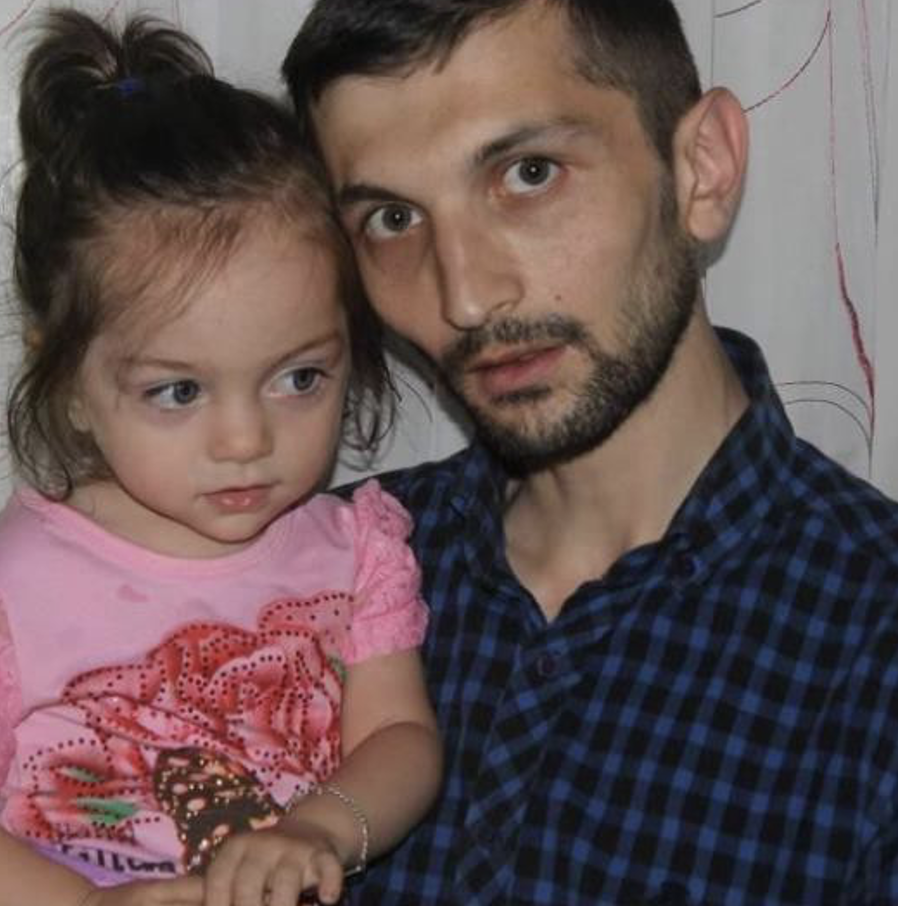
(Courtesy of Gulmira Aslanova and Fuad Hasanov)
Beyond being a loved family member, Aslanov previously served as the chief editor and founder of Azerbaijani-focused news sites Xeberman and News.az. His career has taken a pause since his imprisonment, which started with an accusation by the State Security Service (DTX), the main intelligence and police agency in Azerbaijan, that he was defaming the state, providing foreign countries with sensitive information and putting other Azeri journalists in touch with foreign intelligence agencies, according to news reports at the time.
Aslanov denied all the charges brought against him.
But on Nov. 16, 2020, Aslanov was sentenced to 16 years in prison at the Baku Grave Crimes Court. He was convicted under Article 274: High Treason. According to Fuad Hasanov, a human rights defender working closely on the case, it is considered in Azerbaijan to be the most serious offense. Aslanov is currently serving the third year of his prison sentence.
EXPOSING THE TRUTH
Before his imprisonment, Aslanov worked as a reporter covering corruption for his news sites, which he ran with his wife. Small, independent media, such as those run by Aslanov and his wife, are often subject to intimidation in Azerbaijan from local authorities for their reporting on key issues and criticism of the government.
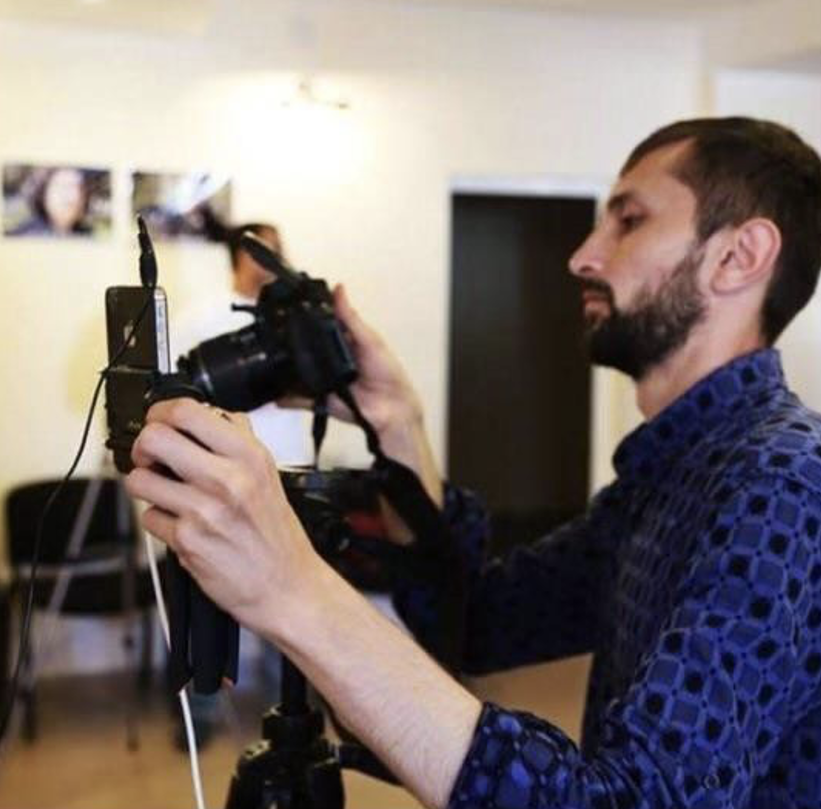
(Courtesy of Gulmira Aslanova and Fuad Hasanov)
For one story, Aslanov had obtained information that DTX employees were illegally demanding bribes from trip organizers taking pilgrims to Iran and Iraq.
Hasanov said in an interview with CNS that roughly 10,000 people from Azerbaijan and other countries participate in these trips each year.
In order to verify this exploitation, Aslanov bought a national passport and traveled south to the border in October 2017, Aslanova told CNS. There he witnessed individuals stopping buses and demanding money from those leading pilgrimage trips to Mashhad, Iran and Karbala, Iraq. When Aslanov returned, he wrote an article about the events he witnessed and published it on his website in December 2017.
In response, authorities offered Aslanov money in exchange for him to delete the stories, but he refused. Instead, he continued to write about corruption cases, using Facebook to publish content to his roughly 200,000 followers. According to Aslanova, these stories received “high interest from the public.”
“[Aslanov] got some warnings from the Secret Service in Azerbaijan, [who told him] ‘you shouldn’t write about these corruption issues in law enforcement, but especially about Secret Service,’” Hasanov told CNS. “But he didn’t pay that much attention to that warning.”
Aslanov could not avoid the warnings indefinitely. On June 12, 2019, authorities took him and his family into custody while they were attempting to enter Iran for a friend’s wedding.
ASLANOVA’S ACTIVISM
“Good morning friends,” Aslanova posted to Facebook the day following her family’s detainment. “Yesterday morning around 10:30 [a.m.] Polad Aslanov, I Gulmira Aslanova and our daughter Fatima Aslanova were detained at Bilasuvar Checkpoint.”
The Bilasuvar Customs Border Point lies directly at a southern border point between Azerbaijan and Iran. In Aslanova’s post, she said that DTX officials brought the family back to a security department in Baku. After being questioned and searched, Aslanova and her daughter were both released, but Aslanov remained in detention for the next four months while investigations ensued.
In the time since, Aslanova has continued to post more content on Facebook regarding the case. She also supported her husband throughout his time in court.
During the trial process, the judge, who is known in Azerbaijan for making politically based decisions, tried to prevent Aslanov’s lawyer, Elchin Sadygov, and other human rights defenders from monitoring the proceedings. Aslanova referred to this as a “closed” trial process.
“Polad was shouting and making noise during the trial process and urging the judges, the investigator, and others that they please organize the open trial process,” Aslanova said.
Feeling out of options, Aslanov went on a hunger strike. After her husband went on repeated strikes, Aslanova said she was finally able to achieve a meeting with the general prosecutor. It resulted in the reduction of Aslanov’s sentence, but only by three years. Still, Aslanova never stopped advocating.
“I was constantly organizing one-person protest actions in front of the State Security Service Office and also at the same time in front of the prosecutor office with the slogan that ‘you cannot arrest the person, judge the person, with fake trumped-up charges and take a very sweet part of his life [all because of a] politically motivated decision,’” Aslanova told CNS.
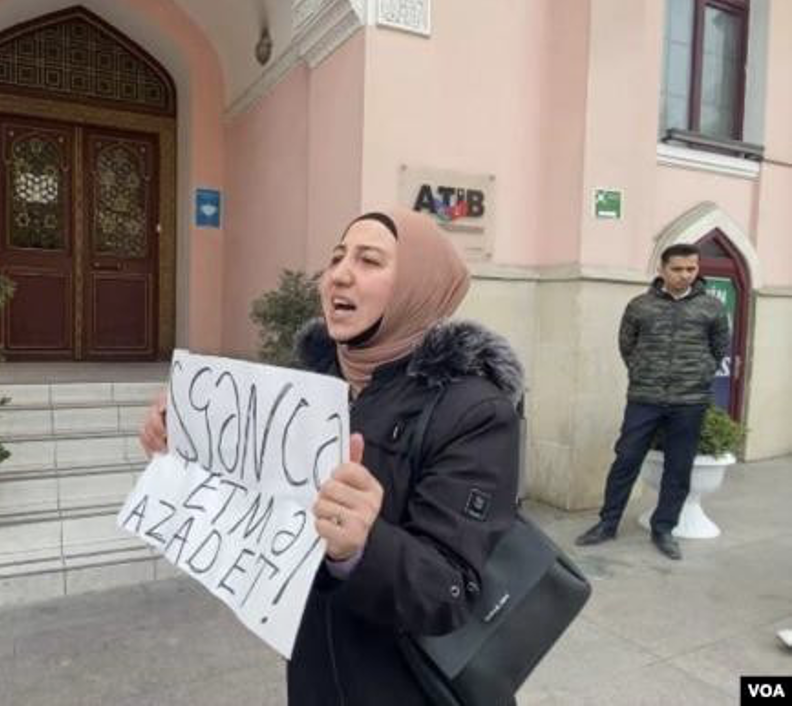
(Courtesy of VOA)
But it was this activism that put a target on her back.
“I was receiving different threatening messages targeting myself and my daughter,”
Aslanova said.
The threats took a toll on the family. Aslanova told CNS that she had to pull her daughter from school out of fear for her safety.
“Several times I was told [that] my daughter and I will ‘pay a price’ for my being actively involved in this case,” Aslanova said. “I was being threatened by the same people that ‘we will come, and we can punish you.’”
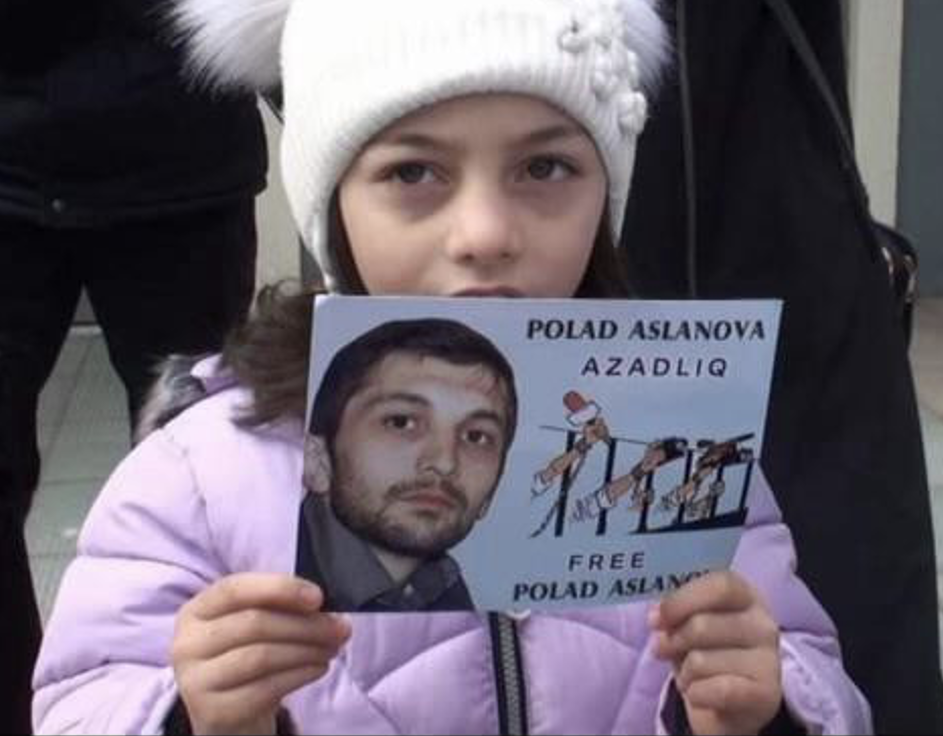
Aslanova has been targeted, along with her mother, for being an active advocate. (Courtesy of Gulmira Aslanova and Fuad Hasanov)
A STRANGLEHOLD ON THE PRESS
The struggles that Aslanov and his family have faced are the result of a longstanding system enforced by the government.
Following their separation from the USSR in 1991, Azerbaijan had two leaders overthrown in two straight years. Heydar Aliyev, an Azerbaijani politician from Nakhchivan – an enclave that is bordered by neighboring Armenia, Iran and Turkey – became the country’s third president in Oct. 1993. A decade later, Aliyev’s son, Ilham, succeeded his father and became the nation’s next leader.
The younger Aliyev has been in charge ever since, currently leading a one-party system called the New Azerbaijan Party, which the U.S. State Department has accused of committing a slew of human rights violations.
Nick Lewis, a correspondent working for press freedom organization Committee to Protect Journalists (CPJ), said, in an email response to CNS, that the country has often jailed journalists on fabricated charges to suppress them, along with the usage of bribery and intimidation tactics.
Those in charge of the Azerbaijani government primarily gain funding through the country’s abundance in oil and natural gas. In 1994, the Azerbaijani government signed a major oil contract, known as the “Contract of the Century,” which included 13 foreign oil companies from eight nations – one of them being the United States. According to Hasanov, this contract has resulted in around $200 billion in profits.
Lewis refers to this situation as an “Oil Curse.”
“Azerbaijan has significant oil and gas reserves and wealth, but this has both promoted the emergence of elite corruption and authoritarianism, and also granted the government huge resources to put into controlling the media environment,” Lewis told CNS in an email.
IMPRISONED IN BAKU
In prison, Aslanov has been denied adequate medical care, according to reports. During earlier visits, Aslanova found her husband with major dental problems and aching pains.
“There are no back teeth on both [of his] palates, they are decayed,” Hasanov told CNS. “[Aslanov] told Gulmira that his back and kidneys hurt.”
In April 2022, problems worsened when Aslanova discovered that her husband had been beaten by another inmate, who, according to Hasanov, “cooperated with the prison.”
“[Aslanov] came from inside the meeting room [and he had] a bruise on the lower side of the eye, so I was surprised and asked him what happened, and he said that ‘nothing [happened]’. But I urged him just to tell me the truth that [his eye] cannot happen by itself,” said Aslanova. “He informed me about the incident that he was beaten and struck by the inmate inside.”
Aslanov applied for medical examination from the prison, but his request was denied.
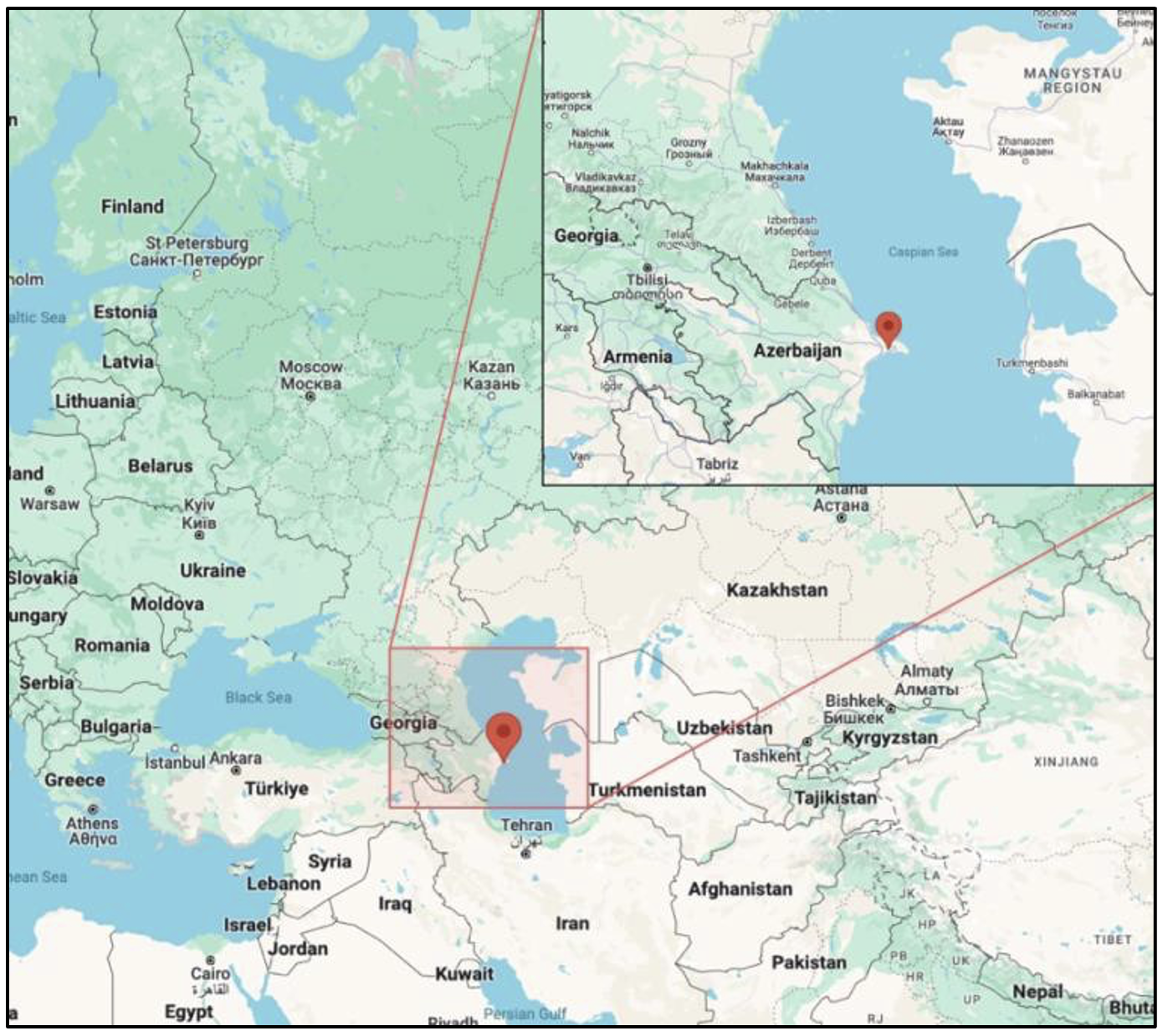
(Google Maps)
WAITING FOR JUSTICE
After exhausting the matter through Azerbaijani courts, Sadigov appealed the case to the European Court of Human Rights (ECHR). Lewis said the ECHR is the appeals court of last instance for human rights-related cases when all appeals on the national level have been tried. Azerbaijan is one of 46 member states of the Council of Europe that the ECHR has jurisdiction over.
But Sadigov’s appeal lost, and the waiting for Aslanov’s family has continued.
There is a chance for Aslanov to be released from prison, but he must submit a letter to the president confessing his guilt, known formally as an amnesty application, according to Hasanov. Those who write this letter have the potential to be released should they appear on a list, known as an amnesty order.
“Polad was told that if he writes an amnesty application, he can be released with the upcoming amnesty order,” Hasanov said.
While the family has tried to get Aslanov to write a letter, Aslanova said her husband is too prideful.
“Polad doesn’t write and doesn’t want to write, and doesn’t agree with their claim to write a letter,” Aslanova said. “And so this attitude perhaps will affect the issue.”
Aslanova said the next order is “expected to take place on March 2024.” The family remains hopeful, but is also prepared for the reality that Aslanov is kept in prison. According to Hasanov, there is no guarantee of a release as authorities can “deceive” Aslanov.
In the meantime, Aslanova is trying to stay in high spirits. She told CNS that she is
“getting power from the honesty of Polad.”
“This is the first [thing],” Aslanova said, “And secondly, I am a believer and I believe in God, that the Gods will not leave me alone.”
The Embassy of the Republic of Azerbaijan in the U.S. did not respond to a request for a comment on Aslanov’s case.

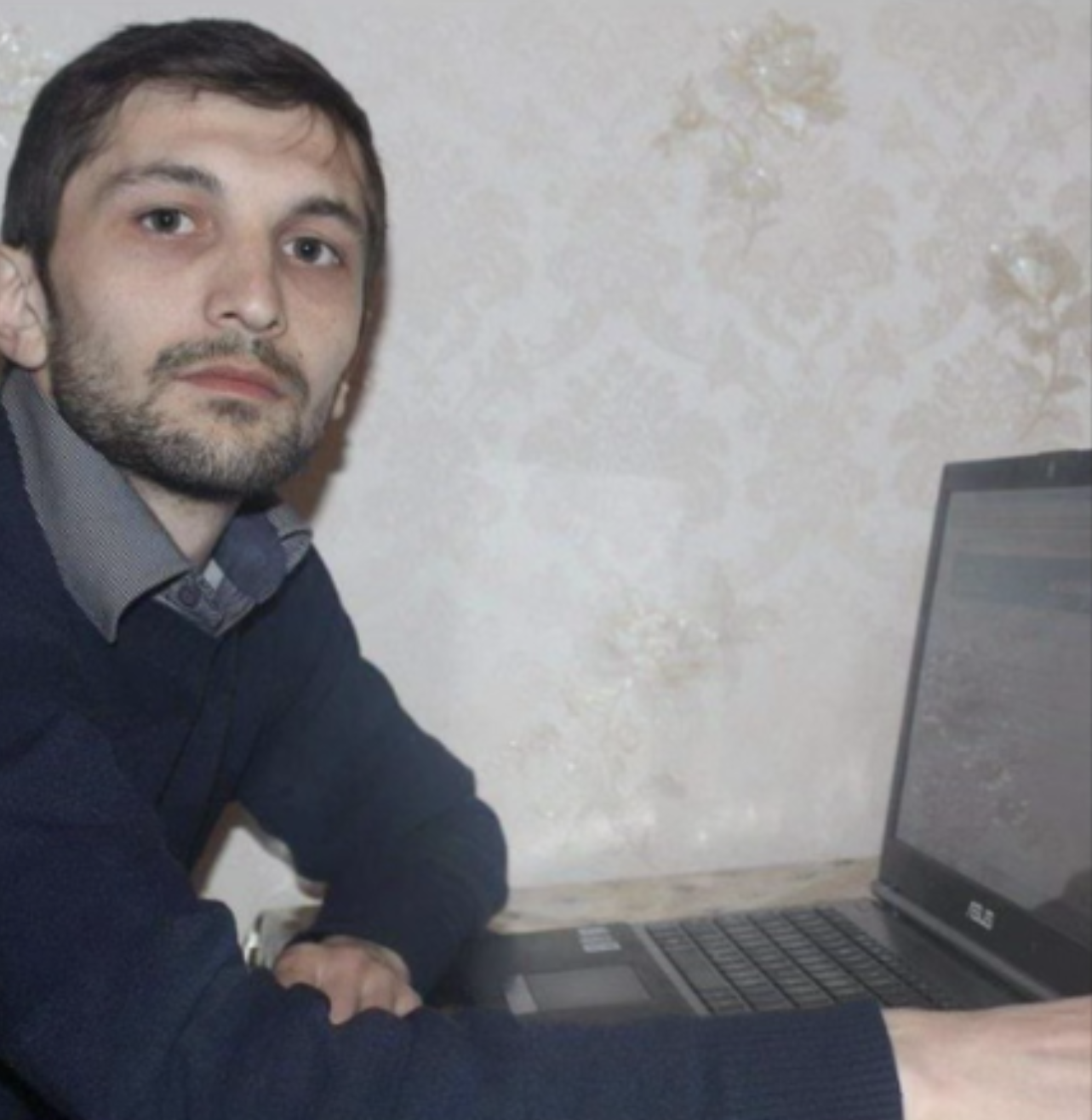
You must be logged in to post a comment.